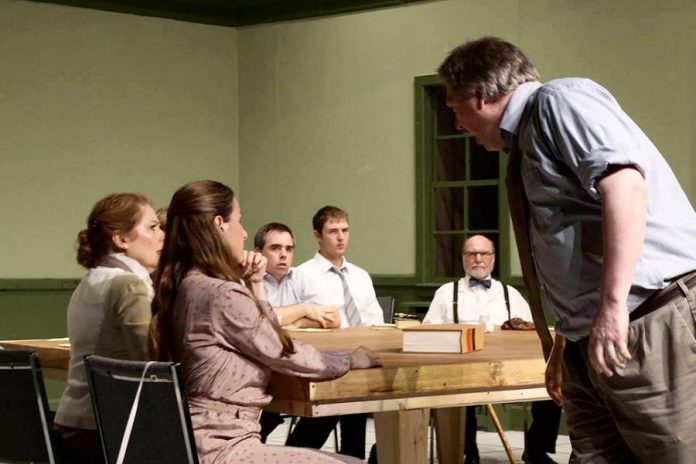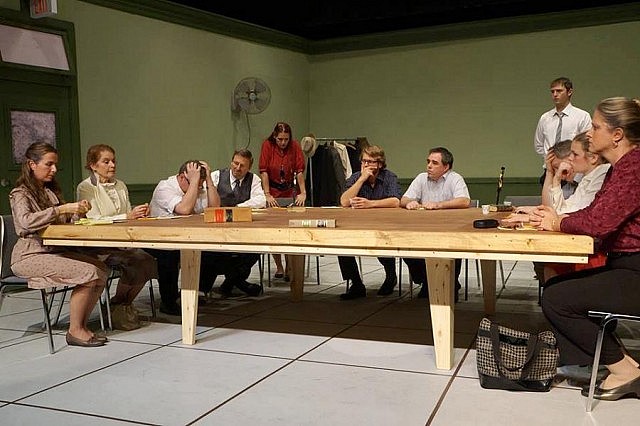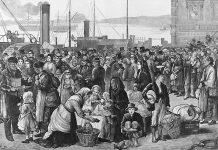
Twelve Angry Jurors — an adaptation of Reginald Rose’s Twelve Angry Men that features a mixed cast of men and women — is a risky production. With a large cast on stage for the entire duration, a sparse set, and long stretches with virtually no action, this wordy and complicated play depends both on the director’s ability to create an atmosphere of tension and the actors’ skill to be much more than just talking heads.
For the most part, the Peterborough Theatre Guild production manages to do just that, successfully creating an engaging and intelligent piece of theatre.
Originally written by Rose as a televised drama for CBS in 1954, Twelve Angry Men was developed as a stage play in 1955 and turned into a film starring Henry Fonda and Lee J. Cobb in 1957. Rose wrote the film’s screenplay as well as several variations for the stage, and the production is regarded as a modern American classic. The play was later modernized for all-female casts (Twelve Angry Women) or mixed casts (Twelve Angry Jurors).
The Peterborough Theatre Guild production is a version adapted by Sherman L. Sergel of the Dramatic Publishing Company in Illinois.
Twelve Angry Jurors takes the audience into a jury room where 12 people must decide the fate of a young man who’s on trial for murdering his father and faces the death penalty if convicted. While it seems an open-and-shut case that the man is guilty, when the jury takes its first vote the results are 11 to one. Andrew Little plays the lone dissenter, who then sets out to persuade the other 11 jurors that the young man is not guilty despite the evidence against him.
Where Twelve Angry Jurors succeeds is in creating a sense of dramatic tension that keeps the the audience involved. I attended a sold-out performance where the audience was so engaged that sometimes you could hear a pin drop, while at other times the audience would gasp or moan in reaction to the drama unfolding on stage. Director Keith Smith successfully finds the right emotional punches that allows the play to captivate the audience, which is the key element to making this production successful.
But when dealing with such a large cast, you also have a lot of different personalities and a lot of different acting styles. The result is often uneven performances. While each juror has a moment in the spotlight, some performances are memorable but others seem to barely register. Although all of the actors give sincere performances, the cast sometimes doesn’t seem to gel as a group. I wonder whether some actors had a good grip on the script: some managed to dance right through without breaking character; others showed very little character at all.

Easily the most relaxed and natural performance in the show is by Seamus McCann, as a smart aleck who made me believe I was watching a real juror instead of just an actor playing one.
Jane Werger, as an European immigrant, delivers uplifting and passionate monologues about the importance of the American justice system, while Jess Mauro gives a chilling performance with a demonstration of a knife fight.
Hugh Mallon gives a sensible performance as the first juror to side with Little, often being the voice of reason in a room full of explosive personalities. Paul Cleveland’s frightening performance, as he storms around the stage in the climax with an elitist and prejudiced rant against the lower classes, gets a huge emotional response from the audience.
Possibly the most dynamic personality on stage is Will Elliot as the play’s main protagonist. Angry, uncontrollable, and ignorant, Elliot plays the character less like Lee J. Cobb and more like Rob Ford. I’m not sure if that was intentional, but it works. It helps the modern audience relate more to his brand of bigotry and ignorance, creating a strong reaction between Elliot’s character, the other actors on the stage, and the audience.
The success of Twelve Angry Jurors is due to the fact that, no matter in what era it’s performed, the show is never dated and is never irrelevant. The emotions remain raw and real, the crime is as old as time itself, and the biases, hatreds and anger of humanity will always exist.
Keith Smith’s production manages to bring all of these elements together in a production that’s sure to engage the audience. It’s good American theatre by a fine director.
Twelve Angry Jurors runs from October 31st to November 15th at the Peterborough Theatre Guild. Tickets are $18 for adults, $16 for students, and $10 for seniors and can be purchased by calling the box office at 705-745-4211.
Twelve Angry Jurors Promotional Video
Photos courtesy of Keith Smith


























